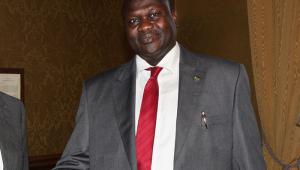His appointment yesterday comes after military officers overthrew long-time ruler Omar Hassan al-Bashir in April, and elections will be held in three years for the first time in decades.
At a news conference, Hamdok told reporters: “The revolution’s deep-rooted slogan, ‘freedom, peace and justice,’ will form the programme of the transitional period,” according to Reuters.
Hamdok was a senior official in the Sudanese Ministry of Finance and Economic Planning in the 1980s, and was recently the deputy executive secretary of the United Nations Economic Commission for Africa (UNECA).
When he left, the commission described him as “a brilliant, true pan-Africanist”.
At UNECA his work covered many areas, such as governance, development, industrialisation, migration, the green economy and challenging illicit financial flows out of Africa.
The UK, US and Norwegian governments congratulated Hamdok on his appointment, hailing his “extensive professional experience”.
In a statement, the three countries (known as the Troika) called for a government that can “rebuild a stable economy”, and promised Hamdok their support.
The Troika said: “At this historic moment, Sudan has a unique opportunity to establish peace within its borders, draft a constitution that enshrines human rights protections and empowers all Sudanese, including women and youth, and create the infrastructure for free and fair elections.”
Sudan’s economy is struggling, especially since South Sudan seceded – becoming independent of Sudan - in 2011, taking the bulk of oil production with it.
In 2018, inflation reached 63.3%, and protests began in December after the government tripled bread prices.
These demonstrations grew, leading to the eventual ousting of Bashir on 11 April.
Hamdok’s appointment is part of a transition from the military government after Bashir’s ousting until a civilian-led government is in place in three years’ time.
Until then, civilian and military figures will sit on a ‘sovereign council’ that will run the country.













